Today I’ll suggest some specific measures to end this war. To start with, the very idea of deescalation as the ultimate goal is absolutely insane. It would mean repeating Napoleon’s mistake. Napoleon worked hard on deescalation – that’s why he lost a war he could’ve totally won🧵 
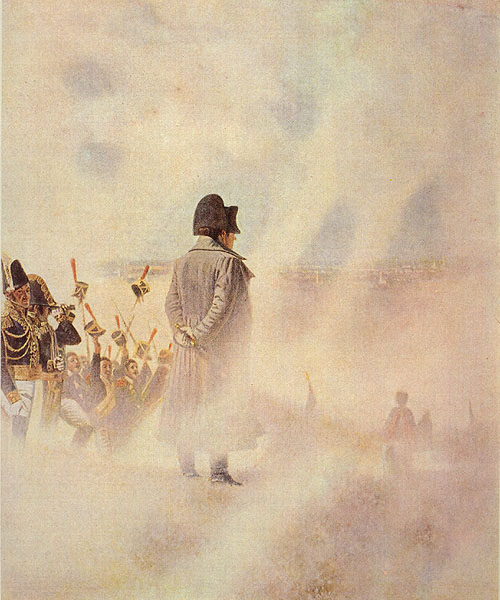
You may object. Invasion to Russia with an enormous pan-European army doesn’t look like deescalation, does it? Yes, Napoleon’s means were destructive. And yet his goals were highly constructive. He didn’t want to overthrow the Russian empire, he wanted to reach a favorable peace 
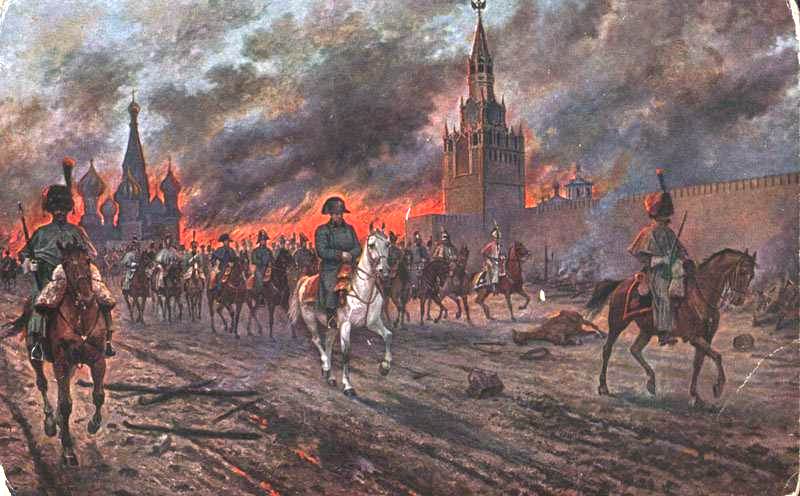
Wars are not launched for military goals. They are launched for political goals. And the political goal of Napoleon was to force Russian Emperor Alexander I into the alliance against Britain and into the Continental Blockade system without breaking Russian empire 
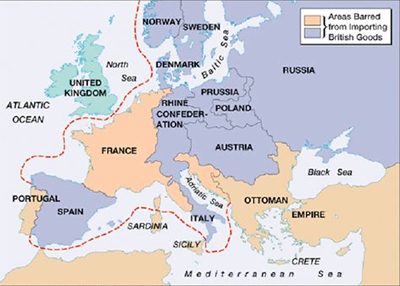
Napoleon didn't view Alexander as an enemy. He didn't want to destroy him. Thus he avoided playing on inner social divisions of Russia . Napoleon launched a purely military campaign and didn't even try provoking a social chaos in Russia - as Russian authorities feared so much 
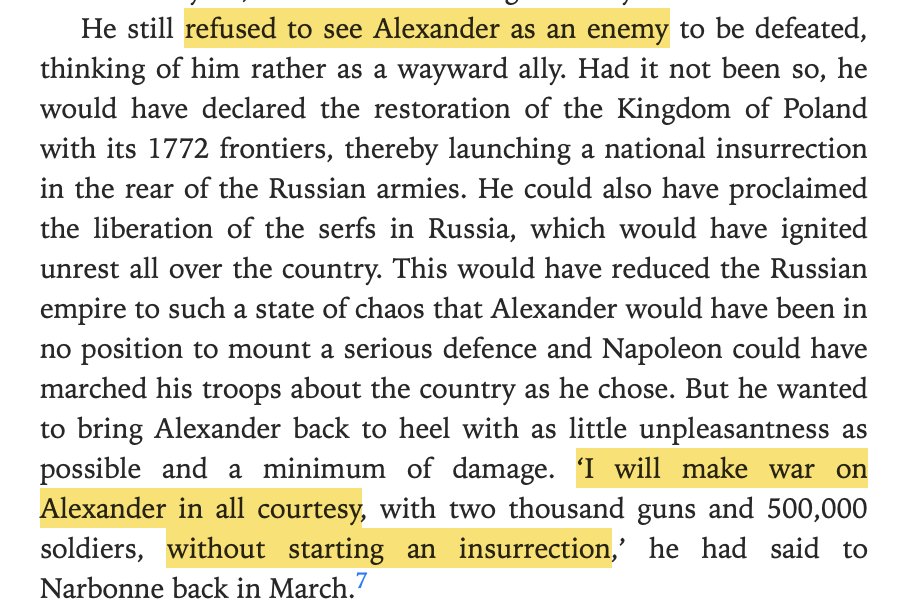
To start with, most Russian people were slaves. Calling them "serfs" is simply a lie. In 1600 Russian крепостничество was indeed comparable to European serfdom. But with every generation it would become worse. By the late 18th c it was very similar to American plantation slavery 
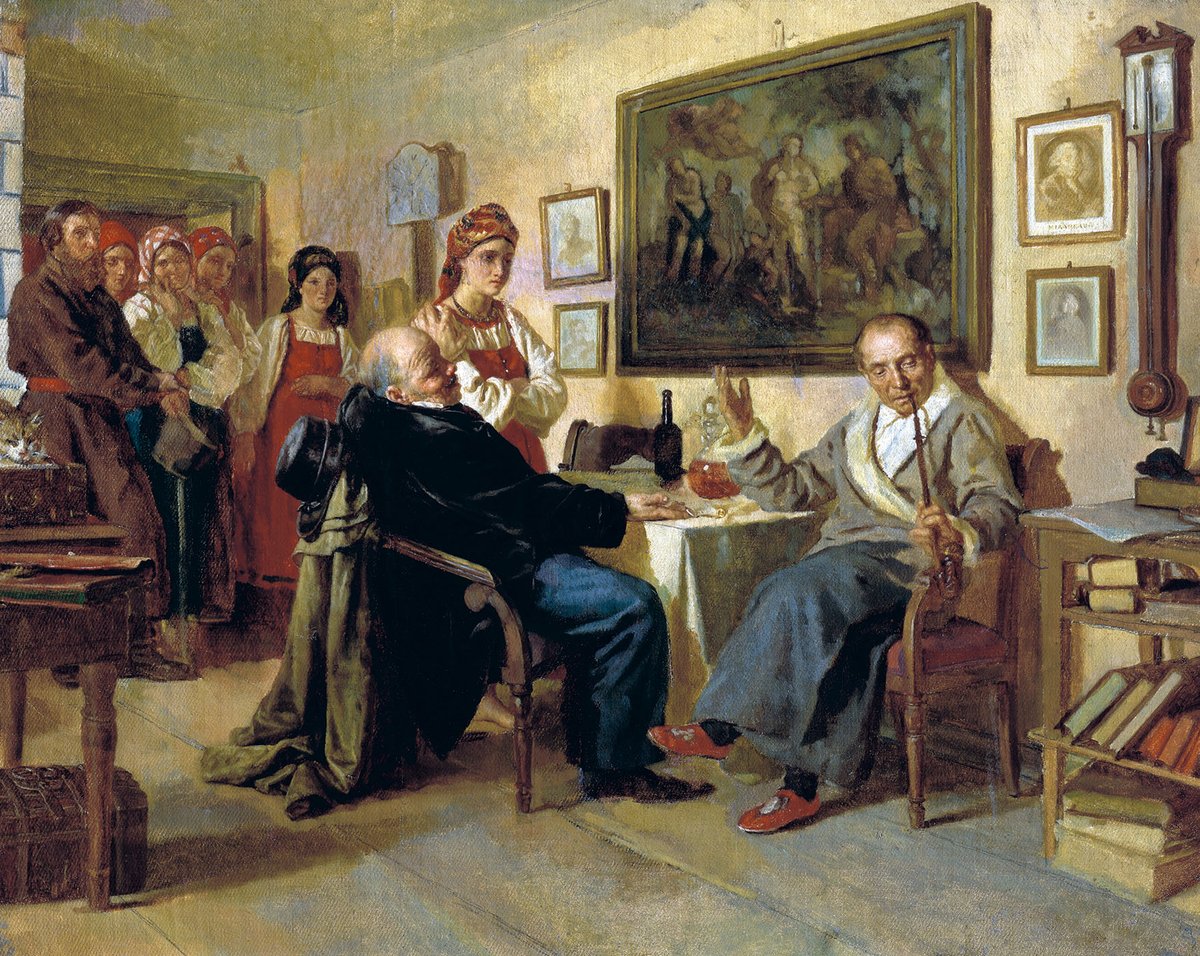
I'll give you an example. First *real* Russian code of laws Соборное Уложение 1649 allowed serfs to complain on their masters who mistreated them. Authorities would investigate these claims. In the age of Alexis they often recognised peasants were right and punished their masters 
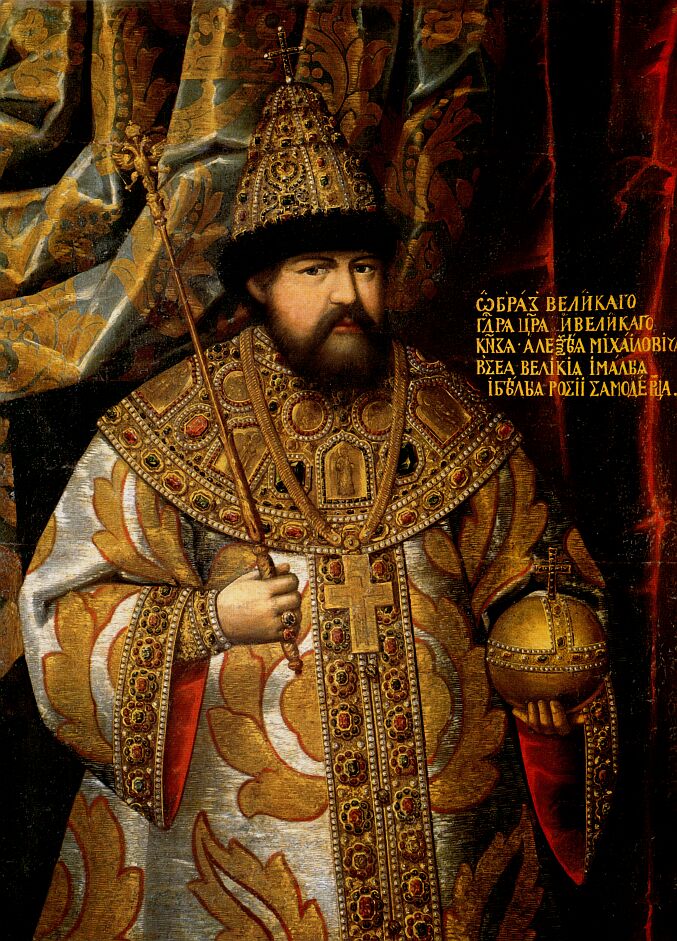
By the age of Peter it was impossible. Nope, nobody abolished this 1649 Code of Laws, it still functioned. But by 1700s we can find almost no cases when authorities would recognise serfs' complaints as valid. Yeah, you can complain. It's just 99% it will be dismissed as a lie 
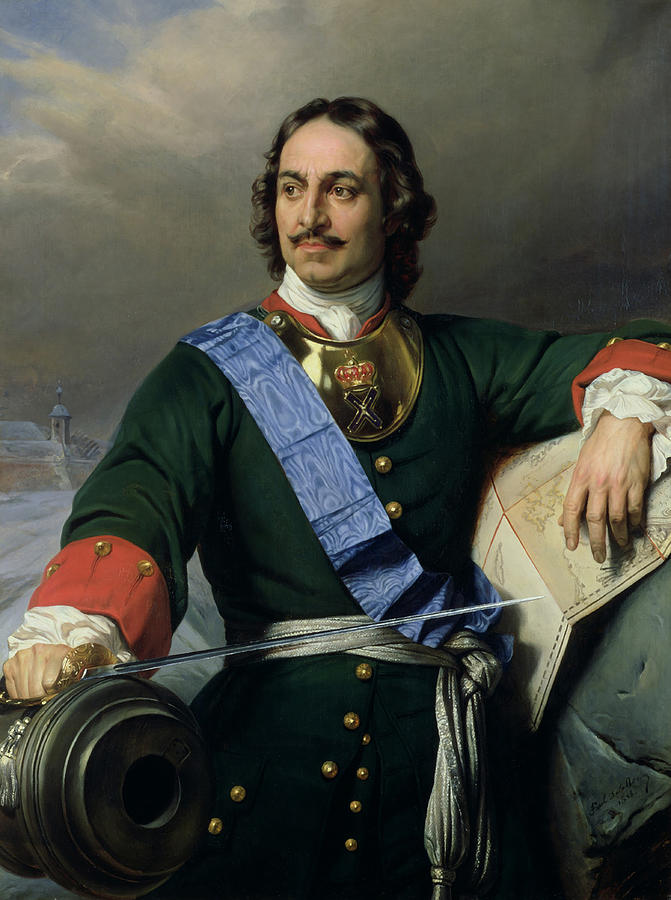
That's why it's absurd to analyze the statute law without considering how it is enforced. Statute law regarding the peasants' rights didn't change much. But the law enforcement changed completely, peasants were stripped of every real instrument to enforce their theoretical rights 

The apotheosis of Russian slavery was reached in the reign of Catherine who stripped peasants of even a formal right to complain on their masters. Now they were whipped and exiled to Siberia for even attempting to complain against their owner 
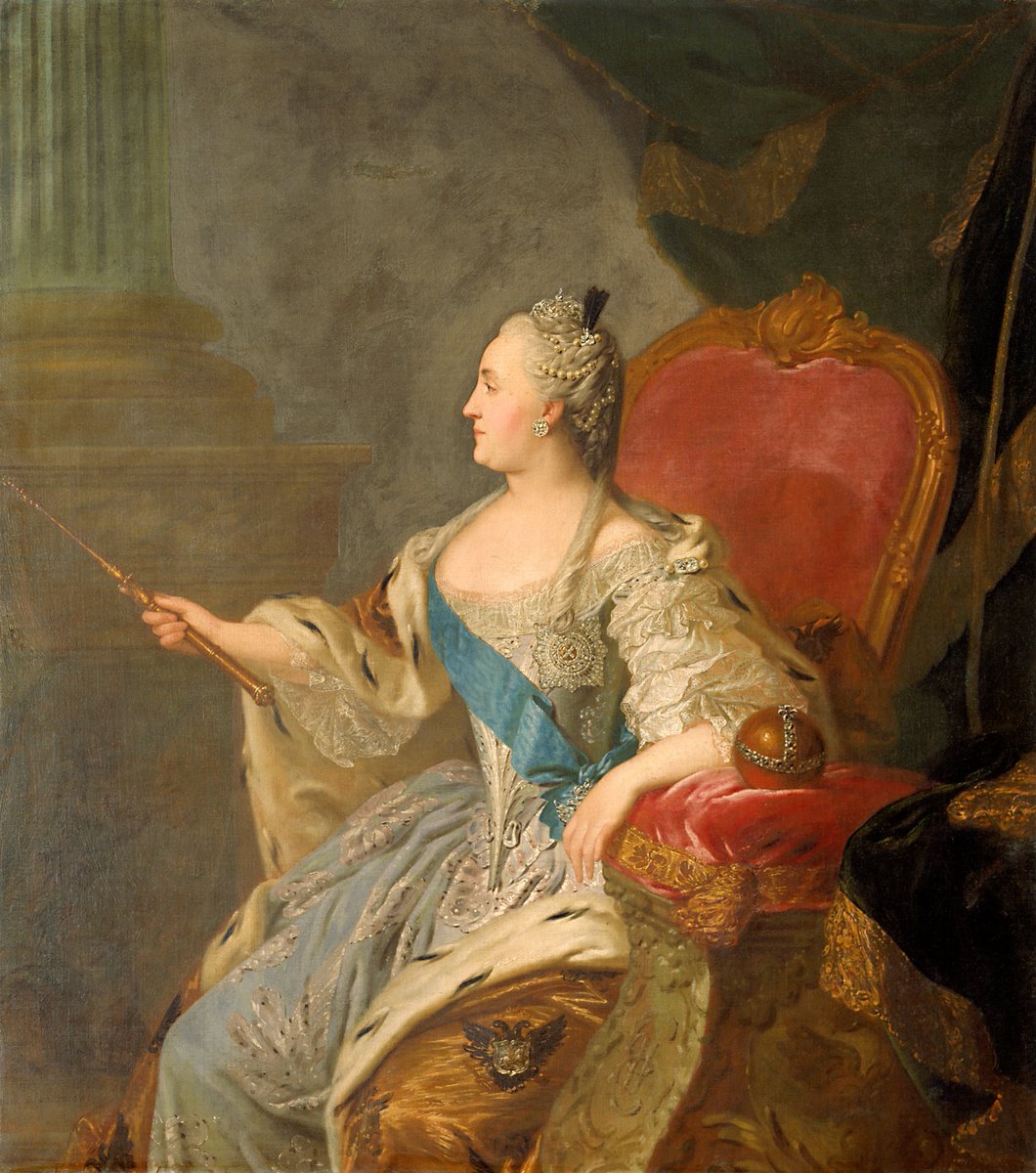
This is the elephant in the room so often ignored when discussing Russian Empire. Yes, it had European high culture, beautiful palaces strong army. But it was paid by 70% of population reduced to plantation slaves, sold on auctions and slave markets, like in Jamaica or Barbados 
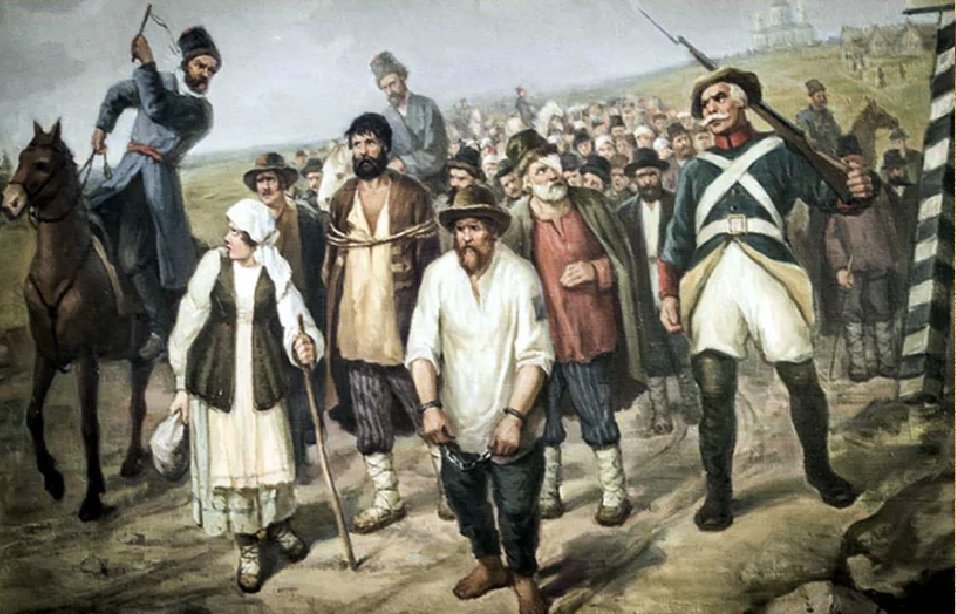
That wasn't a purely Russian phenomenon. After 1500 peasants all over Europe to the East of Elbe were losing their freedom. It was widely criticised by urban elites, e.g. Stralsund alderman Balthasar Prutze in 1614 described Pomeranian serfdom as ‘barbaric and Egyptian servitude’ 

In a sense Russia followed this Eastern European trend with peasants becoming less free with every year. However, in Russia it went lower than anywhere else, to the literal plantation slavery. Why? It was the combined policy of state and aristocracy not checked by any other force 
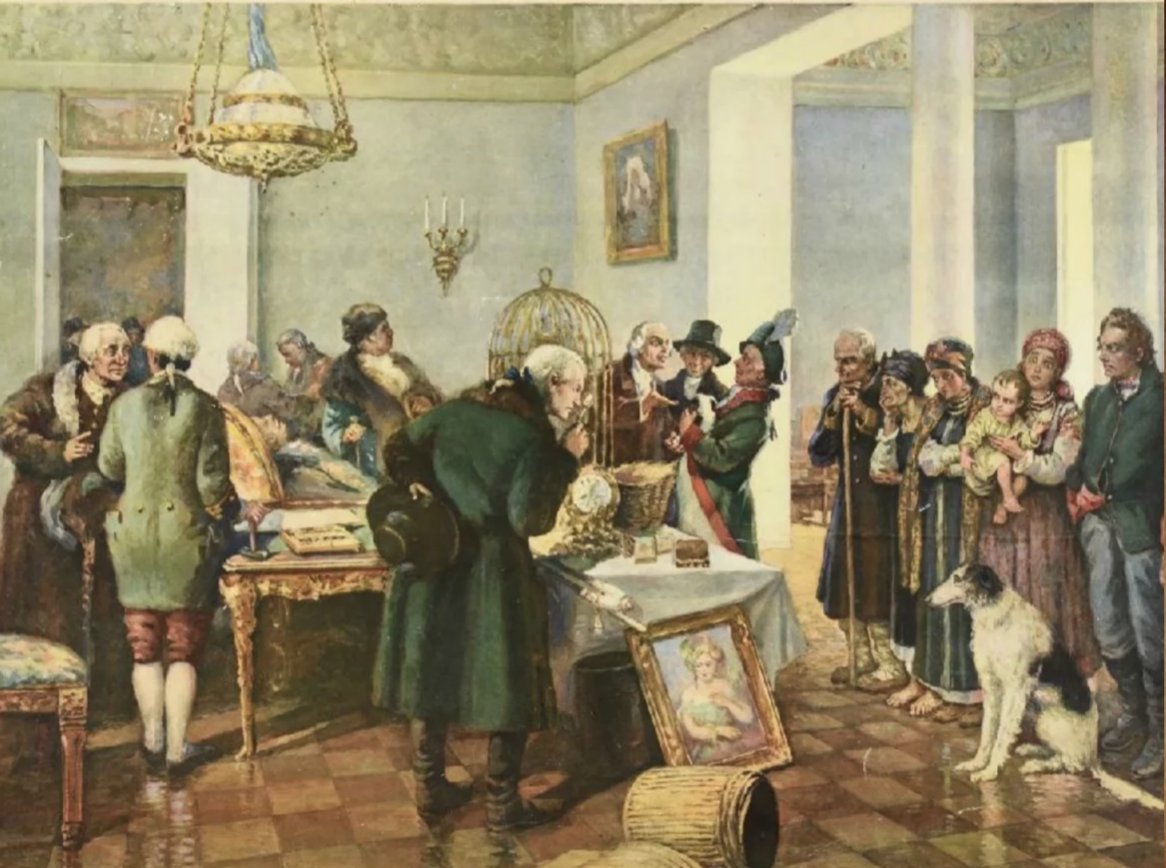
Enslavement in East Germany didn't go that far, partially because it was sabotaged by the urban elites who feared landlords and resented them. So relative freedom of peasants was a result of elite war. But Russian urban classes were weak and the power of aristocracy unchecked 
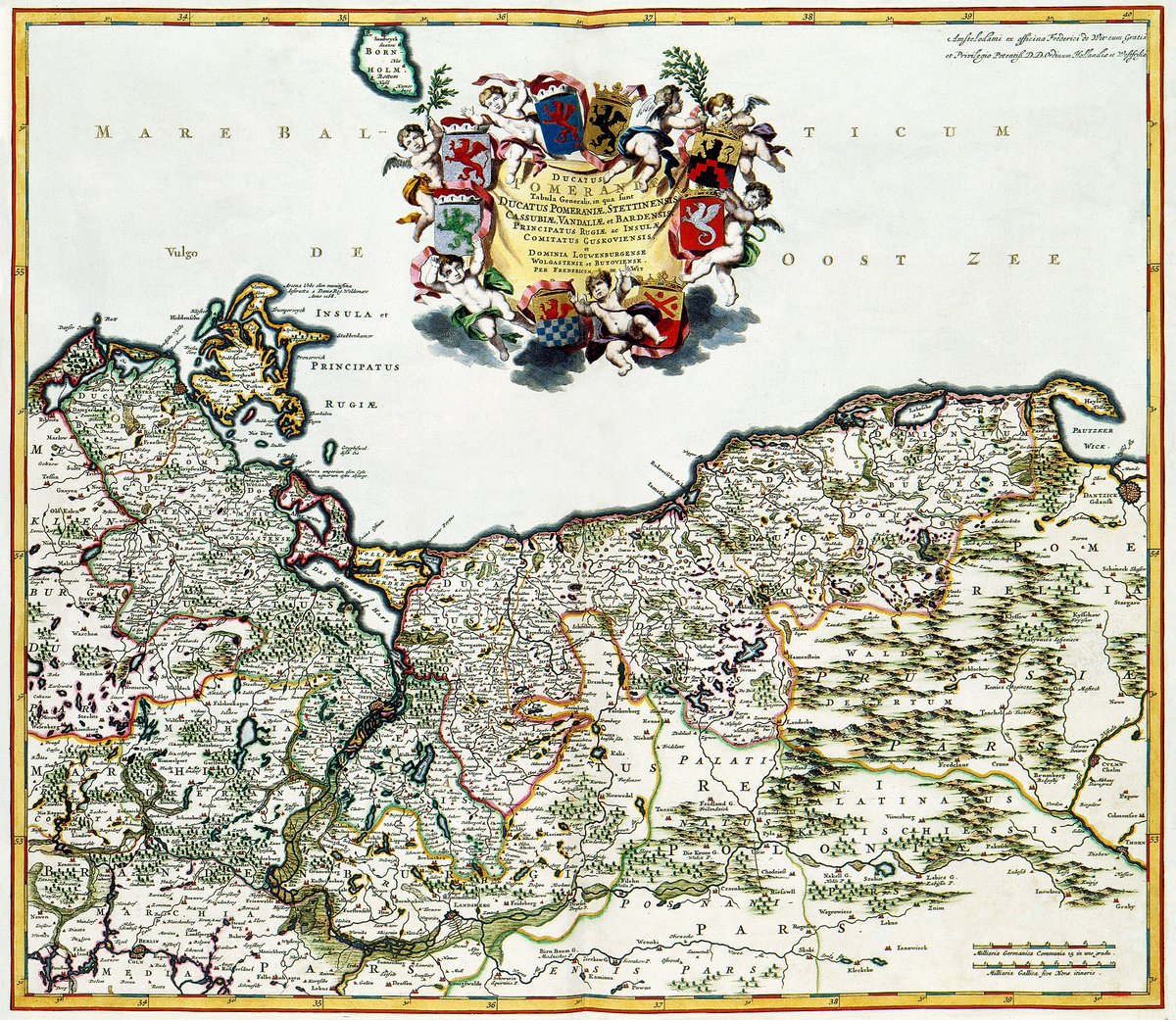
What used to be limited serfdom in 1600 by 1800 evolved into a literal chattel slavery. Consider this advert:
"For sale three beautiful girls of 14 and 15 y. They do needlework, knit purses with monograms, one knows plays gusli. See them and ask the price at Arbat 1 apt N1117"
"For sale three beautiful girls of 14 and 15 y. They do needlework, knit purses with monograms, one knows plays gusli. See them and ask the price at Arbat 1 apt N1117"
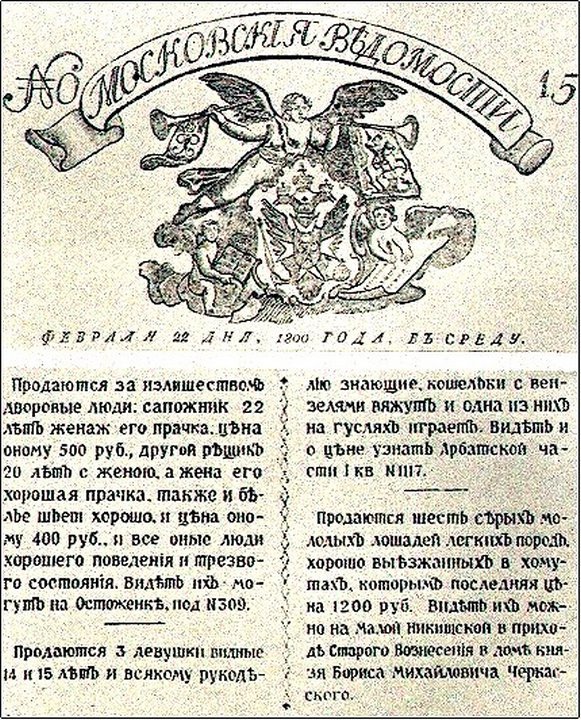
What did serfs think? Official propaganda claimed they are happy. One aristocrat wrote to Catherine how deeply serfs love their masters
"Yeah, that's why they're killing masters so often" wrote Catherine on the fields
She knew everything. She just wouldn't do anything about it
"Yeah, that's why they're killing masters so often" wrote Catherine on the fields
She knew everything. She just wouldn't do anything about it
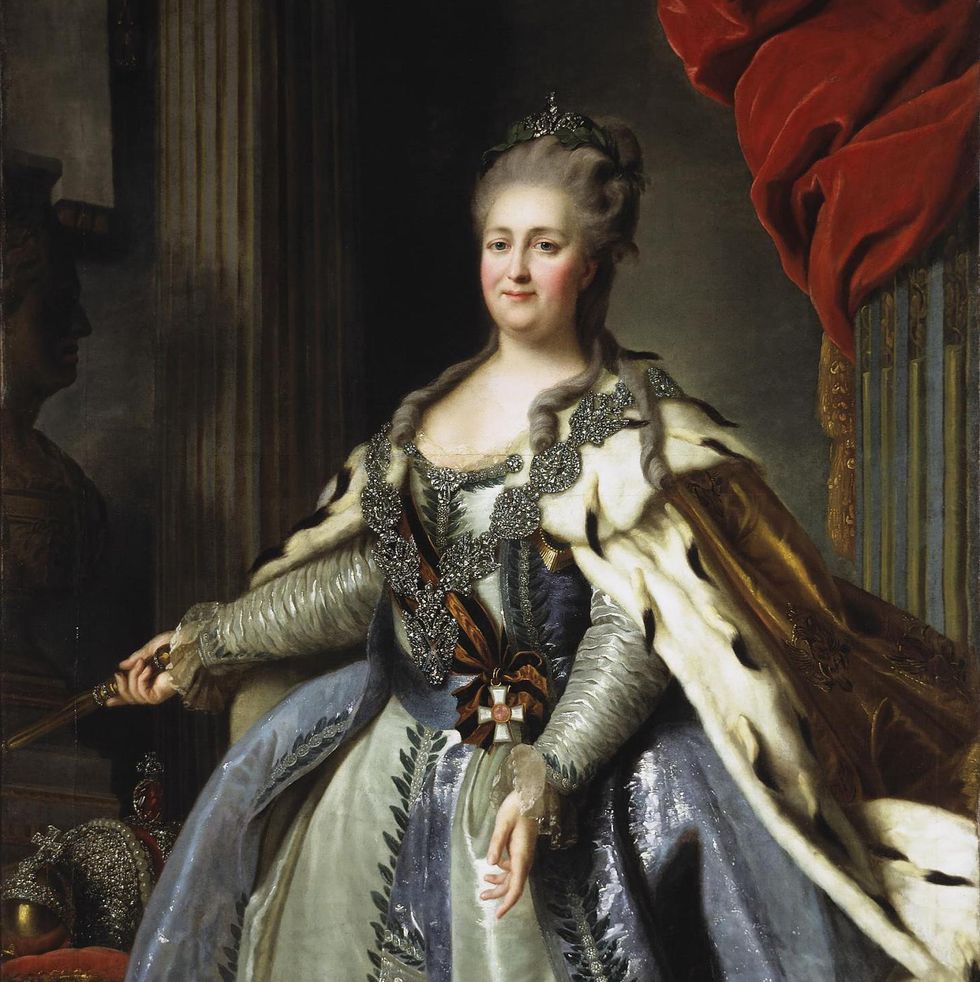
Problem of serfdom was linked to the military problem. Old Muscovy was built on their idea of "justice". Muscovites were either white or black. Black people черные люди had to pay taxes and work. Black people (like these) owed "pulling" тягло to the Tsar. That was their duty 
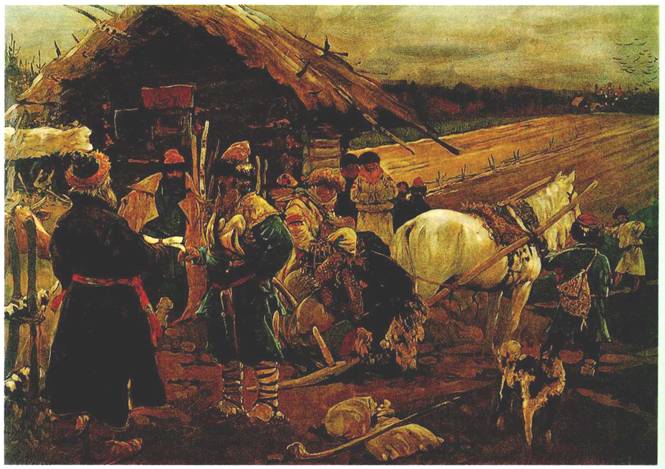
White people, or more correctly, the "white bone", had to fight. That was their duty to the Tsar. That wasn't always true factually, but at least theoretically military service was considered the duty of the white, noble class. Peasants work, noblemen fight 

Btw when you are reading old Russian texts, you should keep in mind that "white" and "black" are not racial, but purely social terms. When Poland-Lithuania and Muscovy were negotiating on finishing the Livonian War, Poles suggested that Moscow is weak because of its inner threats
Poles told: "You just conquered Kazan, it can rebel at any time"
Muscovites told: "All the princes, murzas,and uhlans (=nob;es) in Kazan are exterminated извелись. Only the black people remained, they can't do anything"
= We cleansed the elites, the rest can't launch resistance
Muscovites told: "All the princes, murzas,and uhlans (=nob;es) in Kazan are exterminated извелись. Only the black people remained, they can't do anything"
= We cleansed the elites, the rest can't launch resistance
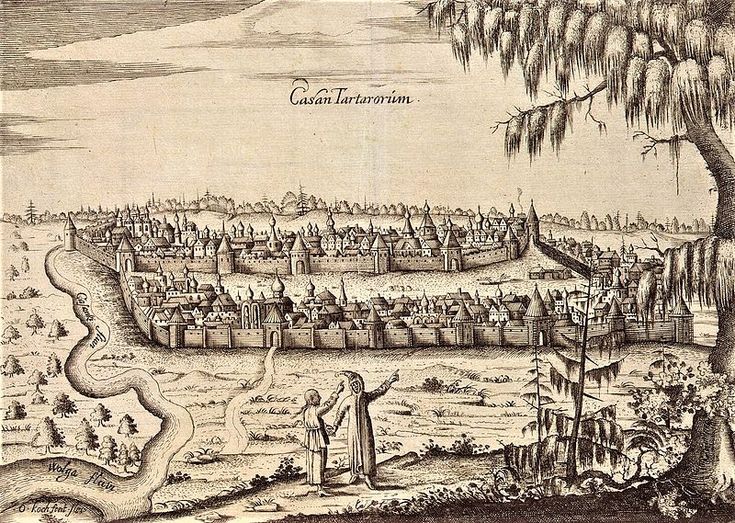
Theoretically Muscovy had some justice - whites fight, blacks work. Since Peter I it changed. First of all, to launch his total war against Sweden he introduced the draft рекрутчина. The state was forcibly drafting a number of commoners every year for a life long military service 
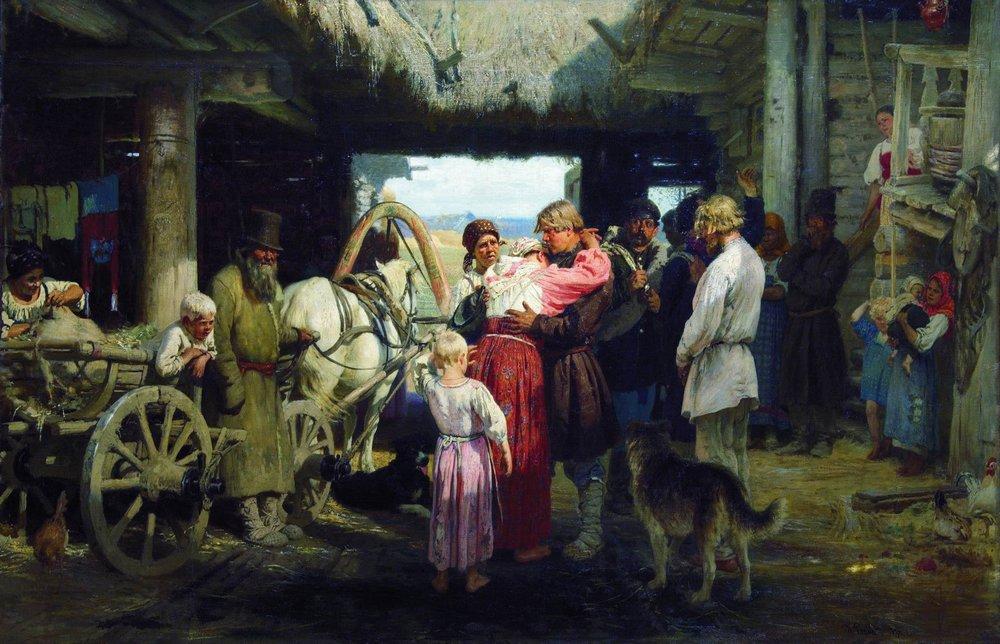
Military service was brutal. You were drafted since as young as 15 or 16. After they chose you for service, they'd put your to chains so you can't escape and transport you to the army, where you'll be subject to excruciating discipline and drilling with little chance of promotion 
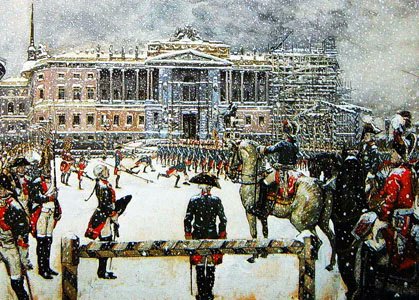
Discipline was maintained by punishments like "dragging through the lines". Two lines get sticks and beat a punished soldier dragged through. Typically 3 000 was enough to kill, but they could give 5 000+. In 1800s they would typically kill one soldier from a regiment per week 
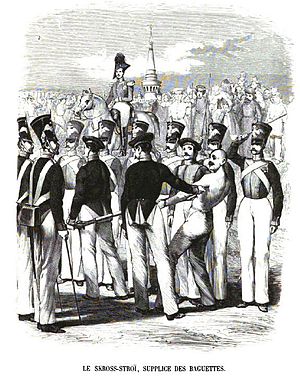
Discipline in most European armies was brutal from the modern perspective. However, Russian army had a lifelong service. In late 18th c it was reduced to 25 y. but practically speaking it didn't matter. Once you're drafted, you never get out. A soldier = unburied corpse 
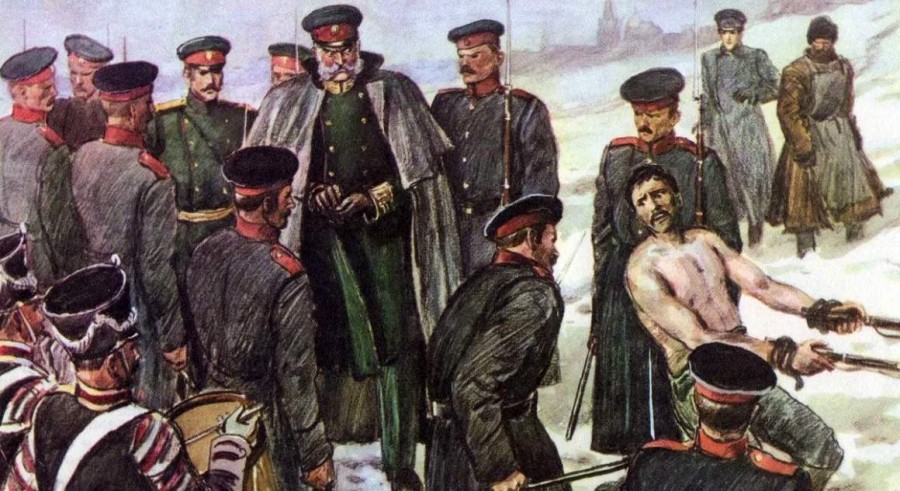
Very importantly, while Muscovy had some idea of justice: commoners work, noblemen fight, Russian Empire didn't even try to keep it. While subjecting commoners to serfdom, taxation, corvee and the most hated duty - military draft - it relieved nobility from any duty at all 
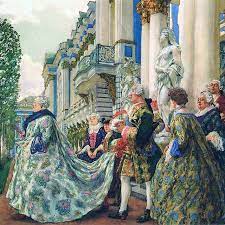
In 1760s nobility was relieved of compulsory service, be it civil or military. This created a hugeasymmetry. Commoners, work, pay, fight - in terrible conditions - while nobility is free to do whatever. Russian Empire was much more obviously unjust than the previous regime 
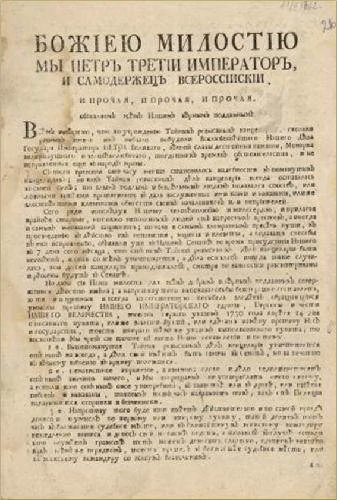
This created a huge social tension. Both greatest Cossack rebellions in Russia - of Razin and Pugachev - never presented much danger military-wise. But wherever Cossacks went, serfs would massacre their masters en masse. Besides, many soldiers would desert and join the Cossacks 

If American dream was to be a millionaire, a Russian dream was to be a Cossack. That's what pretty much every Russian peasant wished. They didn't aim to be nobles, social envy doesn't go that far, only Cossacks. Cossacks knew it and offered Cossack status to whoever who joins 

This tension seldom led to soldier mutinies. It mostly led to voting by legs via desertion. Russian soldiers deserted en masse to Ottomans, Chechens, Old Believers, Cossack rebels, to whoever would give them the way out. They were instrumental in remodelling Persian army in 1800s 
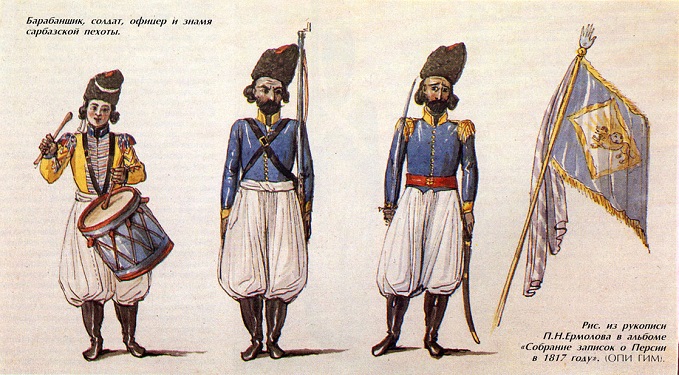
To put it simply, Russian Empire had enormous, incredible social tensions even among its ethnic Russian population (minorities made it even more complicated). Imperial government was very anxious Napoleon would play it. And you guess what? He didn't
(I'll pause for like 15 min)
(I'll pause for like 15 min)
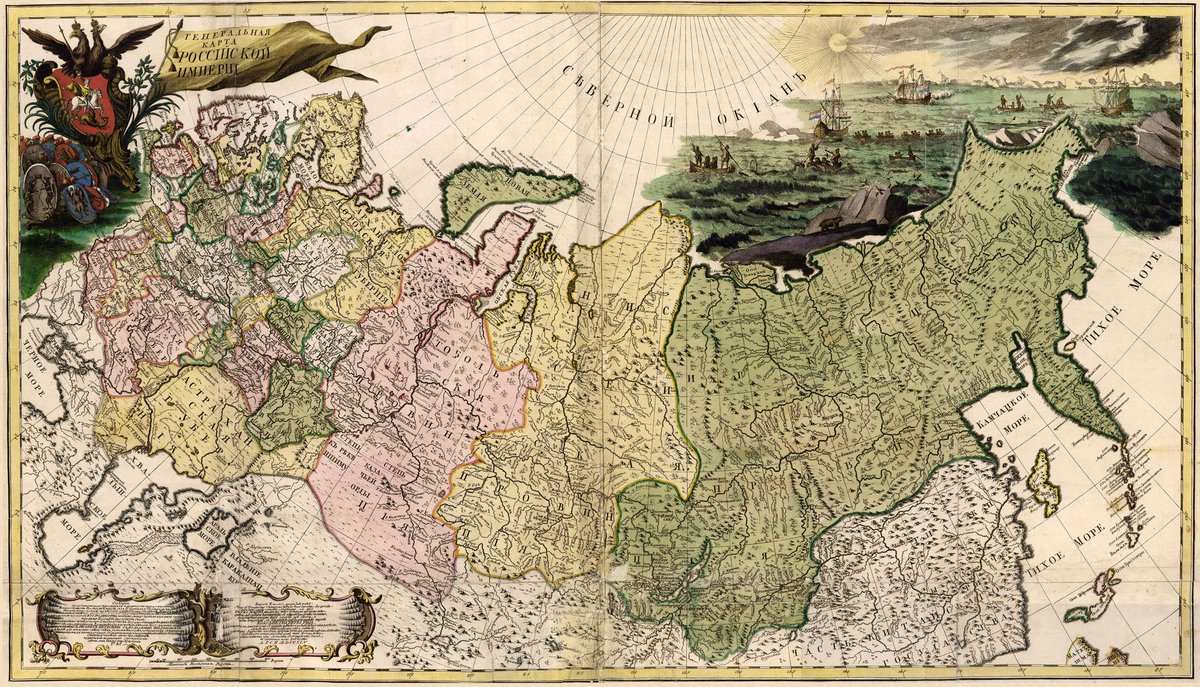
Trying to negotiate wasn't wrong idea. But the question is - what leverage will you use to negotiate? Threats work only that far. Moral preaching, too. Usually you need to give some carrot. NB you should give not what *you* consider to be carrot, but what *they* view as such
How were the large animals initially domesticated? I really like the theory that ancient people used the same trick modern hunters use - salt traps. They would give animals salt (which they need badly), so they have to come. Even husbandry has an element of bribe and negotiation 

You *have to* bribe. If Napoleon wants sth from Alexander - join the Continental Blockade - he has to offer him something he needs. But Napoleon couldn't. He used preaching, seductiion, force, but in vain. Because he didn't have a real material carrot and the British did 
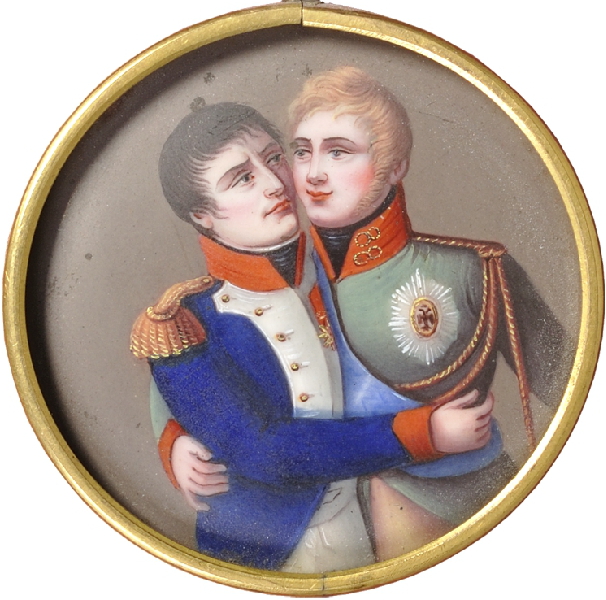
Any form of Russian-French alliance was doomed, because Napoleon couldn't offer Alexander salt. He tried to use military leverage, and it didn't work out. Why? Because to maximise the damage on Alexander he should've offered salt to those who needed the salt Napoleon had
You need to give people want they want they want. Now what do they want? That's usually very simple to understand, they won't shut up about it. They may express indirectly through projections though. For example based orthodox Russia is largely a projection of Western right wings 
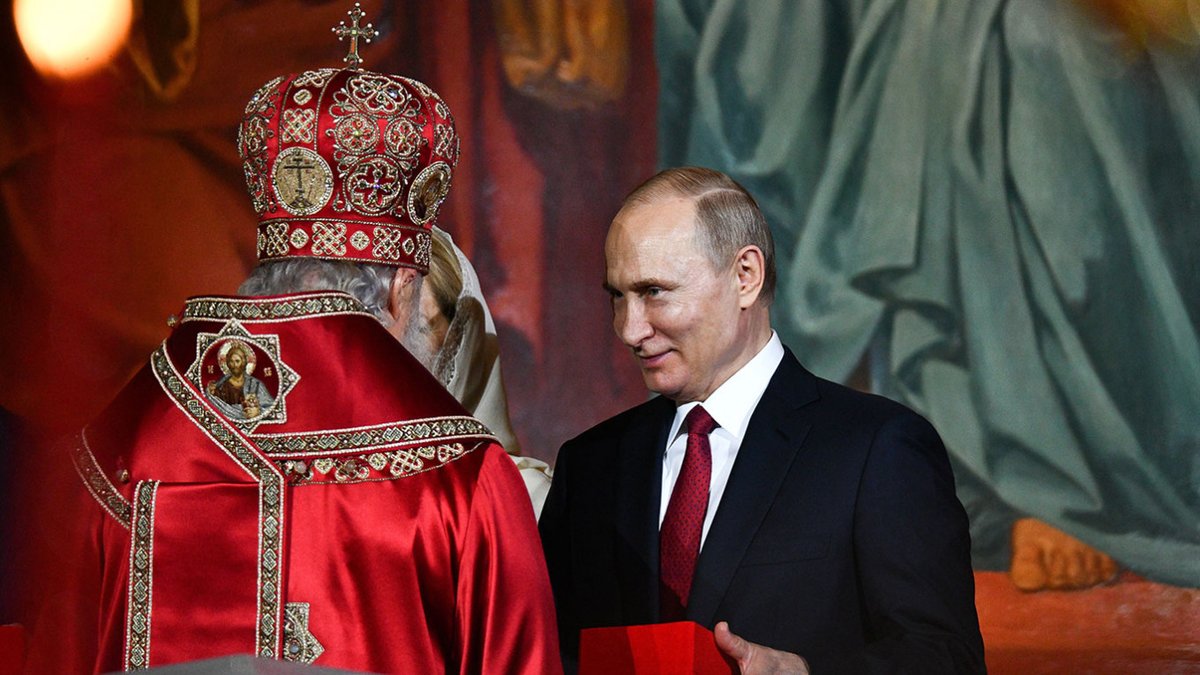
Western right wings desire a great Christian conservative power which will save them from the wokes. They dream about it day and night. That's a very need and of course they project their need to the nearest available candidate - Vladimir Putin, viewing him as a parental figure 
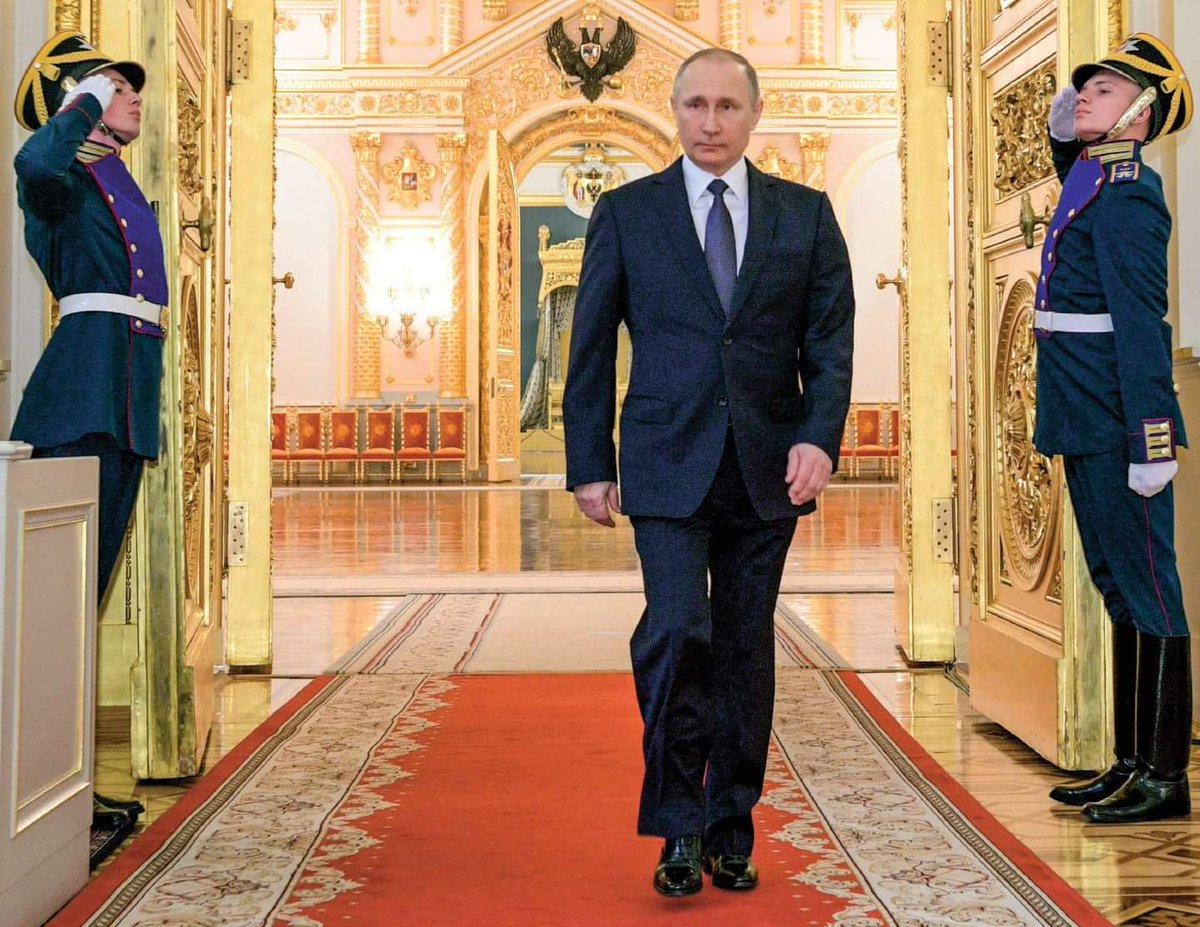
The same way Western intellectuals idolise Dugin. Why? Because it's their projection. Since the days of Plato intellectuals have been dreaming of taking a position of a Philosopher, advising a tyrant. The smartest of them like Plato and Carl Schmitt tried, it usually ended badly 
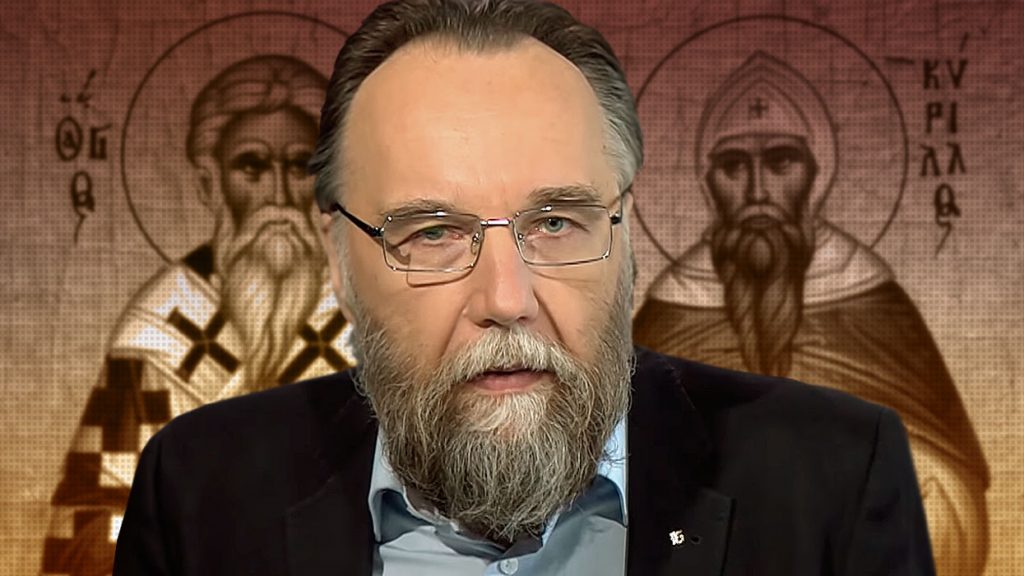
Western intellectuals know they'll never become Tyrant's advisors. But they want to believe that in some frozen Hyperborea there is a tyrant consulted by a mysterious philosopher. They chose Dugin to project their own needs on him. Why Dugin? Well, he has a beard, easy to idolise 

Why Dugin is so well known in the West, his importance being hugely exaggerated, and Galkovsky - the most important figure of modern Russian nationalism, who created its language of hatred, is unknown? Perhaps he doesn't look menacing, difficult to project your own dreams on him 

If you want to negotiate with someone you usually need to offer them salt they *really* need and not what you think they need. How do you know what they really need? Usually they won't shut up about it and will project 24/7. That's how you figure out what you must offer them
Now what Russian people were projecting on the eve of Napoleon's advance? Oh, that's pretty easy. Primarily - the abolishment of serfdom. Dreaming, projecting and praying for Napoleon's conquest of Russia started long before he crossed the border 24th of June 1812 
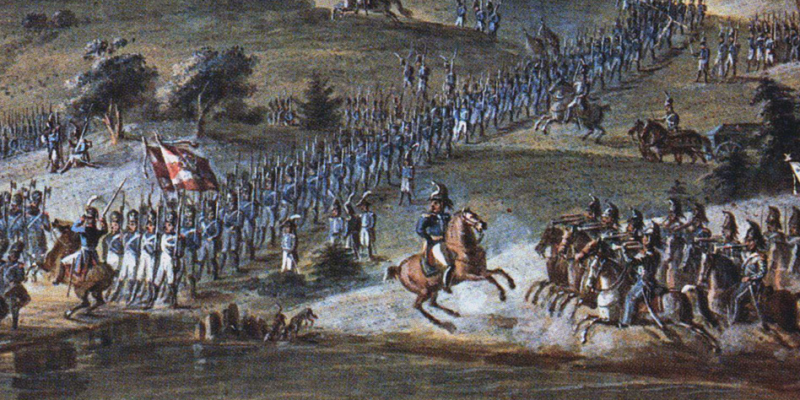
Russian police archives contain lots of cases of serfs arrested for treasonous talk. Most importantly, that the imminent Napoleonic invasion brings them freedom. Earliest arrests that I know of were done in 1807, but in months preceding the invasion, the number expanded greatly
A typical treasonous rumour - the real cause of war is that Napoleon wants to liberate Russian serfs. And that he wrote to Tsar Alexander he'll fight against him until he liberates peasants. As you see, it's pure projection. Serfs were projecting on Napoleon their real needs
Governor of Moscow Rostopchin wrote to the emperor Alexander. Yes, we amassed huge levies. But they'll become nothing as soon as the "rumours of a supposed freedom will rise the people to earn it and massacre nobility which is the only aim of low classes in all their mutinies" 

Few weeks before the Napoleonic invasion, general Raevsky wrote to emperor Alexander:
"I'm afraid of Napoleon's proclamations that could give freedom to the people, I'm afraid of internal unrests in our country"
"I'm afraid of Napoleon's proclamations that could give freedom to the people, I'm afraid of internal unrests in our country"

What is missed in the history of Napoleonic invasion is how eagerly peasantry tried to switch to Napoleon. Governor of Tver Kologrivov learnt that villages in Porechsky district "fantasise about belonging to the French forever". Indeed, they decided they're now French subjects
Polish-Lithuanian support of Napoleon is well known. It was quite common, even though Napoleon didn't play fully. He didn't even declare the restoration of independent Rzeczpospolita - if he did, he'd get *way* more support. But people collaborated even in purely Russian lands
Attacks on landlords, burnings of their houses were starting weeks before the French would actually come to a town. After Napoleon occupied Moscow, many villages in the Moscow region refused to obey their masters claiming that since Napoleon rules in Moscow, he's their Tsar now 
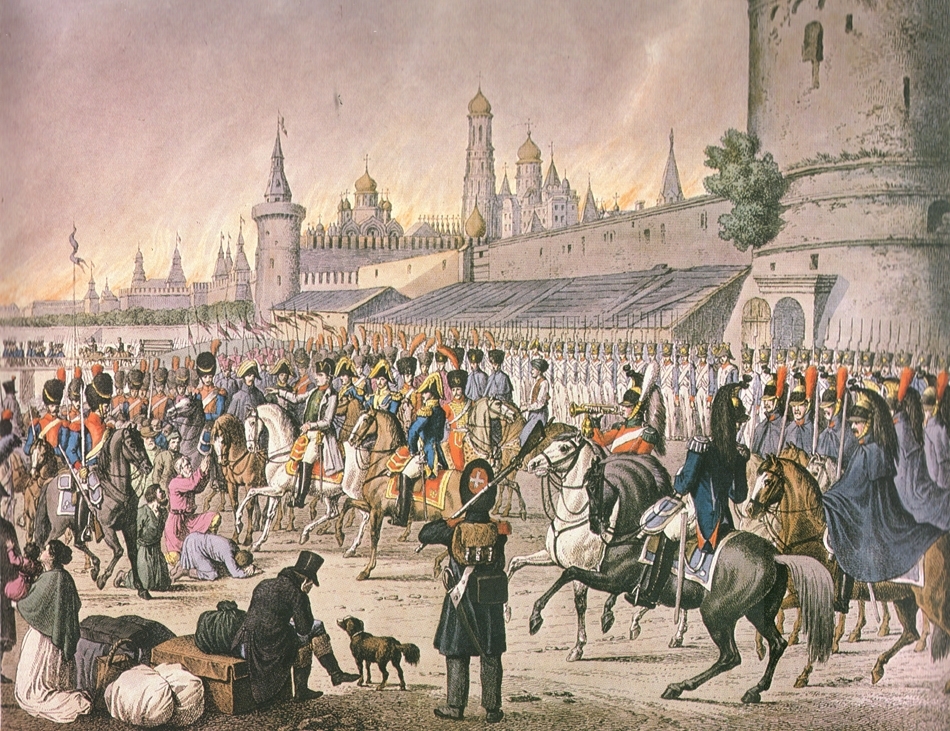
Interestingly enough, governor of Moscow Rostopchin ascribed these unrests to the "bad influence of the levy". Peasants were drafted to the levy en masse without proper training or control and they turned into the unruly force dreaming of Russia's defeat. Many had to be disbanded
As you see Russia had huge social tensions and divisions which could be easily played on. But Napoleon didn't. He thought he needs strong Russia as a tool in his continental blockade, and didn't want to disrupt it, turning it into chaos. He wanted to keep the machine intact 
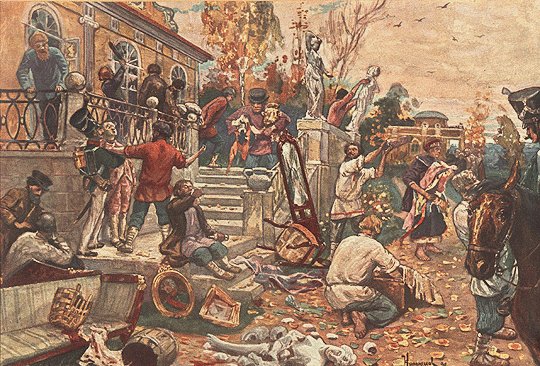
Another concern was ideological. Napoleon established a monarchy and now viewed any anarchic movements as highly problematic. He avoided weaponising mass discontent, even if he totally could. Peasants were making up that he wants to liberate them, because they were projecting 
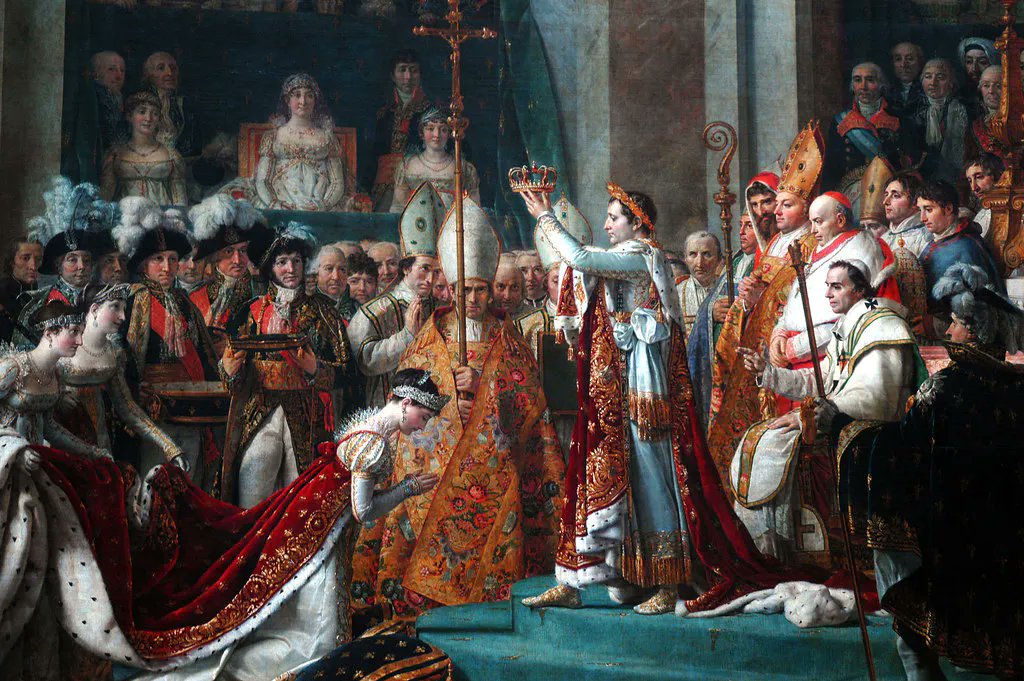
Napoleon aimed for an unreachable goal - alliance with Alexander. It was unreachable because Napoleon didn't have a salt to offer him. He had a salt to offer to the many discontent in Russia, but didn't, because he believed he can work out a compromise with Alexander (nope)
What would be the best salt strategy for Napoleon?
1. Freedom to the peasants
2. Freedom to the soldiers. You don't have to fight me, just go home and skip next 20 years of military service
3. Independence to minorities and the conquered
4. Equality to the Old Believers
1. Freedom to the peasants
2. Freedom to the soldiers. You don't have to fight me, just go home and skip next 20 years of military service
3. Independence to minorities and the conquered
4. Equality to the Old Believers

Jewish role in Russian revolution is discussed a lot, but it's largely a projection. Westerners project their own culture wars on Russia. Meanwhile the elephant in the room - dissidence *within* the Orthodox Church is ignored. It's difficult to weaponise in Western culture wars 
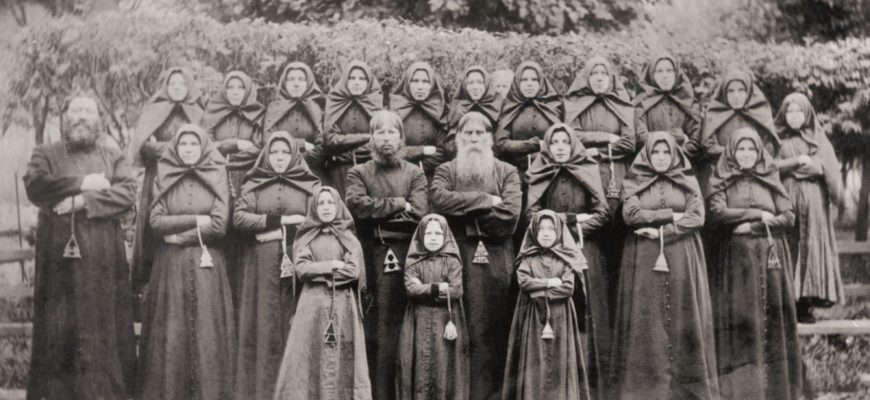
So now let's get to the policy recommendations for the current conflict. The best strategy would be playing on internal divisions which are enormous. Giving salt to the ones who need the salt you have and not fantasising about deescalation with the ones who don't
First. Make surrender of Russian troops in Ukraine as easy and lucrative as possible. Ukrainians understand it and try to work on that. They try to lure Russian soldiers to surrender "to save their lives", they're offering pilots a million usd to turn over their jet to Ukrainians
I don't think it gonna work well. First, Slavs don't really believe in Slavic financial guarantees. If it was let's say a Swiss company offering money, it would have stronger appeal. Great strategy would be - offer cash for 1) turning over 2) destroying Russian military equipment
The very fact that you might get a lot of cash in hard currency for destroying a Russian missile system, adding sugar to the oil or doing other sabotage would very much destroy the trust among the troops. Especially regarding that many already look for the way out
Another obvious question is - ok, I surrender. Now what? Honestly speaking, right now I don't see any attractive perspective. What you gonna do after, return to Russia where they investigate how and why you surrendered? Doesn't look that promising to be honest
Some speculate about giving surrendering Russian soldiers refuge on the West. It could be a good idea, but I don't think it may really be organised soon. And in order to have an impact on the course of war the green corridor for surrendering Russians should be organised asap
A more realistic option would be negotiating with some warm countries with easy immigration policy (Colombia, Argentina, etc) and simply paying them to accept surrendered Russians. So they would get them some sort of visas + small cash for surrendering + a lot for active sabotage
I know that doesn't sound efficient moral crusade wise. But it absolutely can be efficient goal wise. With the conflict ongoing, much of the world would be in a deep economic crisis, and there will be warm countries with easy immigration policies desperately looking for cash
Many Russian troops in Ukraine have very low motivation. Conscripts were sent by force. Many national guard paramilitary feel tricked into the war. When they transferred from the police to the newly created guard, they thought they're getting military benefits with no risk
Cops thought they get military mortgage etc with no downsides. Instead they were sent to a bloodbath. Many started complaining that the entire reform was about "tricking cops into the war". If you watch this video with destroyed Russian convoy, you'll see why they want to escape
Finally, many of the "Donbass and Luhansk army" are also low motivated. In the jargon of Russian irredentists there there is such a word as twenty-five-thousanders, двадцатипятысячники. What does it mean?
On the early stages of Donbass war, it was launched my highly motivated fighters. Russian security apparatus, intelligence and many local volunteers. As it usually happens on wars, they ran of volunteers quickly. Their casualties are huge, while the supply is limited
Fortunately for Russia, Donbass fall into humanitarian catastrophe. Most businesses closed, remaining like cpal mines, paid minuscule salaries among the rampant inflation. It was very difficult to earn your living. So Russians would pay 25 000 rubles for joining "Donbass army"
These people were called twenty-five-thousanders because they obviously joined for pay check, around 400 usd per month. They were looked down upon because they had lower motivation and honestly they'd prefer to collect the pay check and skip the fighting
This case shows first of all, that the Donbass crisis was manufactured and maintained by Russia. They portray it as a natural mass rebellion, but almost all of actual fighters were unmotivated ones who literally fought for food, because of humanitarian catastrophe Russia created
Secondly, American military always exaggerate how easy it is to crush this or that group by force (with no salt offered) and underestimate how cheap it is to bribe them. As a rule, people who end up on war are poor (by standards of a region). There are few rich kids in trenches
Thirdly, huge number of Russian military in Ukraine are low motivated. They don't want to fight. They would rather turned back and go to Russia, but that's not an option now. They would escape, but don't know where. Give them the way out. Give a green corridor to a *warm* country
Add a small cash payment for the fact of surrendering and large ones for documented sabotage/turning over the military equipment and you'll be surprised how quickly Russian fighting ability deteriorated, partially because of sabotage, partially by decline in mutual trust
I'll finish with a little known fact. Borodino Battle near Moscow was the single bloodiest day of the Napoleonic wars. Russian soldiers stood all day beating off one French attack after another. They lost 39 00 men, but didn't run away being gunned, shelled and charged by cavalry 
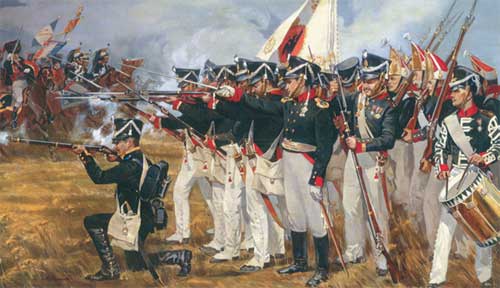
You know where Russian army lost more men than at Borodin? In France. After Russian army occupied France, soldiers realised that this is a far richer nation. And after Napoleonic wars it has few men in countryside. So you can easily find a girl wit HER. OWN. PLOT. OF. LAND.
In a rich country with few adult males who now how to farm their positions on sexual and economic market were great, far better than they could ever be in Russia. Bonus point, the country had no passport system, so you could just disappear and it would be hard to find you
And the army started disintegrating. It probably lost around 45 000 men due to desertion, much more than at Borodino. Tsar Alexander was very upset and asked king Louis if he could find them. Louis said sorry no - and Alexander marched out with remaining forces out of France asap
The same soldiers who stood to death against Napoleon when they had no way out, deserted in huge numbers the moment they saw they way out and advantageous perspectives after. So they voted by legs, ending Russian occupation of France quicker than planned
This should be taken into account when planning modern policies. If you want to influence people, you should give them salt. And you give it to those who *really* need the salt you have. Napoleon deluded himself he has salt Alexander needs, but he couldn't offer him anything
So the reasoning shouldn't go like "Cooperation with whom would be the most useful for me?" but "who desperately needs the salt I have and will need it for sufficiently long time?". These will be the only on whose cooperation you can truly rely
The West can very easily and very cheaply give salt to Russia military in Ukraine. It's way cheaper than sending military equipment there. It also can reasonably give salt to Russian officials many of whom now see their situation as desperate and hopeless
West can even give salt to Russian military and intelligence chiefs. It seems Putin didn't consult them about his invasion of Ukraine and dragged them all into existential war without their knowledge or approval. Many of them will be looking for way out and will cooperate
I just don't see which salt the West could give to Putin. Lift sanctions and resume trade? Well, he'll accept it, but now it'll just buy him time to re-orient to China. It won't influence his long term goals, it will just make meeting them way more realistic. End of 🧵
• • •
Missing some Tweet in this thread? You can try to
force a refresh





